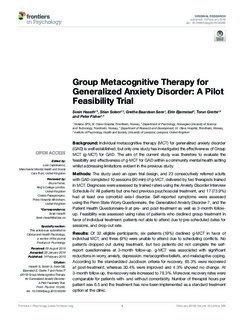| dc.contributor.author | Haseth, Svein | |
| dc.contributor.author | Solem, Stian | |
| dc.contributor.author | Baardsen, Grethe Sørø | |
| dc.contributor.author | Bjørnstad, Eirin | |
| dc.contributor.author | Grøtte, Torun | |
| dc.contributor.author | Fisher, Peter Leonard | |
| dc.date.accessioned | 2019-09-24T06:44:40Z | |
| dc.date.available | 2019-09-24T06:44:40Z | |
| dc.date.created | 2019-02-14T09:58:55Z | |
| dc.date.issued | 2019 | |
| dc.identifier.citation | Frontiers in Psychology. 2019, 10 1-10. | nb_NO |
| dc.identifier.issn | 1664-1078 | |
| dc.identifier.uri | http://hdl.handle.net/11250/2618336 | |
| dc.description.abstract | Background: Individual metacognitive therapy (MCT) for generalized anxiety disorder (GAD) is well established, but only one study has investigated the effectiveness of Group MCT (g-MCT) for GAD. The aim of the current study was therefore to evaluate the feasibility and effectiveness of g-MCT for GAD within a community mental health setting whilst addressing limitations evident in the previous study.
Methods: The study used an open trial design, and 23 consecutively referred adults with GAD completed 10 sessions (90 min) of g-MCT, delivered by two therapists trained in MCT. Diagnoses were assessed by trained raters using the Anxiety Disorder Interview Schedule-IV. All patients but one had previous psychosocial treatment, and 17 (73.9%) had at least one comorbid axis-I disorder. Self-reported symptoms were assessed using the Penn State Worry Questionnaire, the Generalized Anxiety Disorder-7, and the Patient Health Questionnaire-9 at pre- and post-treatment as well as 3-month follow-up. Feasibility was assessed using rates of patients who declined group treatment in favor of individual treatment, patients not able to attend due to pre-scheduled dates for sessions, and drop-out rate.
Results: Of 32 eligible participants, six patients (19%) declined g-MCT in favor of individual MCT, and three (9%) were unable to attend due to scheduling conflicts. No patients dropped out during treatment, but two patients did not complete the self-report questionnaires at 3-month follow-up. g-MCT was associated with significant reductions in worry, anxiety, depression, metacognitive beliefs, and maladaptive coping. According to the standardized Jacobson criteria for recovery, 65.3% were recovered at post-treatment, whereas 30.4% were improved and 4.3% showed no change. At 3-month follow-up, the recovery rate increased to 78.3%. Moreover, recovery rates were comparable for patients with- and without comorbidity. Number of therapist hours per patient was 6.5 and the treatment has now been implemented as a standard treatment option at the clinic.
Conclusion: g-MCT for GAD is an acceptable treatment which may offer a cost-effective alternative approach to individual MCT. Recovery rates and effect sizes suggested that g-MCT could be just as efficient as individual MCT and cognitive behavioral therapy. | nb_NO |
| dc.language.iso | eng | nb_NO |
| dc.publisher | Frontiers Media | nb_NO |
| dc.rights | Navngivelse 4.0 Internasjonal | * |
| dc.rights.uri | http://creativecommons.org/licenses/by/4.0/deed.no | * |
| dc.title | Group Metacognitive Therapy for Generalized Anxiety Disorder: A Pilot Feasibility Trial | nb_NO |
| dc.type | Journal article | nb_NO |
| dc.type | Peer reviewed | nb_NO |
| dc.description.version | publishedVersion | nb_NO |
| dc.source.pagenumber | 1-10 | nb_NO |
| dc.source.volume | 10 | nb_NO |
| dc.source.journal | Frontiers in Psychology | nb_NO |
| dc.identifier.doi | 10.3389/fpsyg.2019.00290 | |
| dc.identifier.cristin | 1677284 | |
| dc.description.localcode | Copyright © 2019 Haseth, Solem, Sørø, Bjørnstad, Grøtte and Fisher. This is an open-access article distributed under the terms of the Creative Commons Attribution License (CC BY). The use, distribution or reproduction in other forums is permitted, provided the original author(s) and the copyright owner(s) are credited and that the original publication in this journal is cited, in accordance with accepted academic practice. No use, distribution or reproduction is permitted which does not comply with these terms. | nb_NO |
| cristin.unitcode | 1920,22,0,0 | |
| cristin.unitcode | 1920,17,0,0 | |
| cristin.unitcode | 194,67,40,0 | |
| cristin.unitname | PH - Nidaros distriktspsykiatriske senter | |
| cristin.unitname | PH - Avdeling for forskning og utvikling | |
| cristin.unitname | Institutt for psykologi | |
| cristin.ispublished | true | |
| cristin.fulltext | original | |
| cristin.qualitycode | 2 | |

